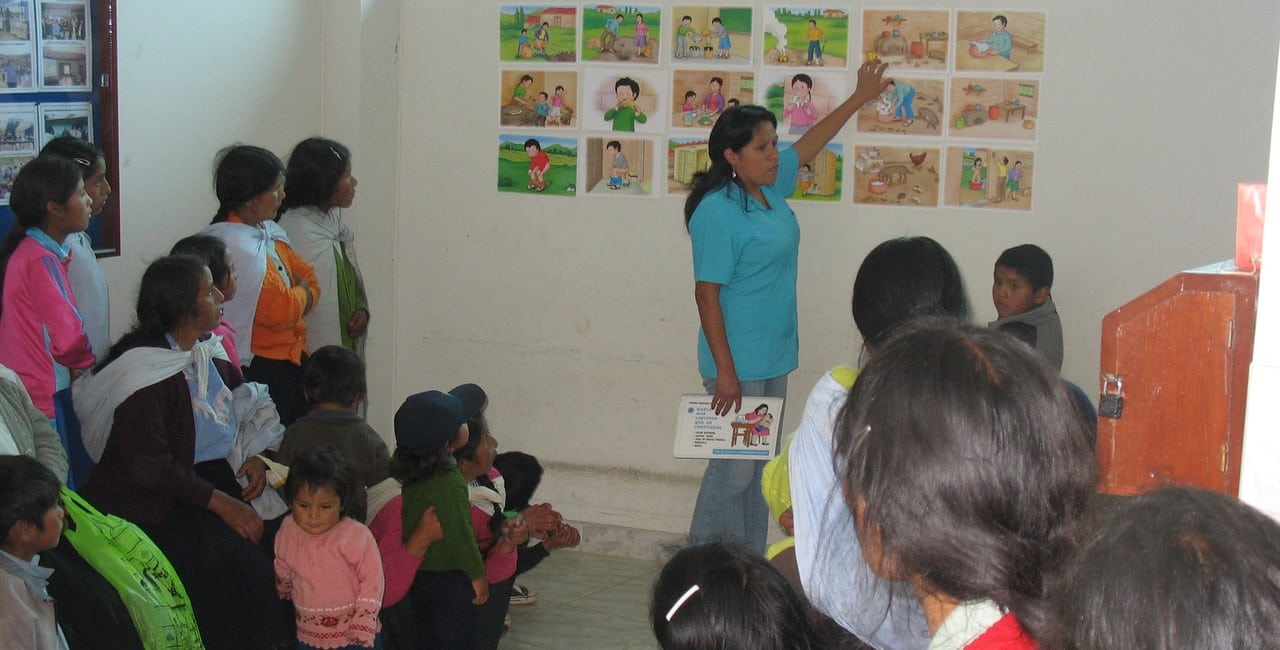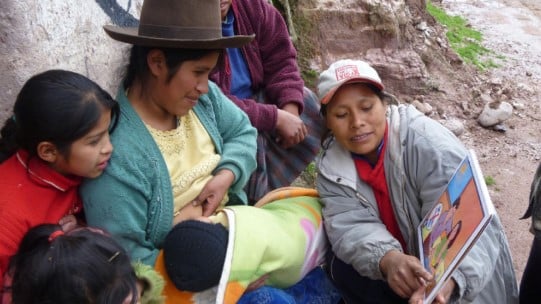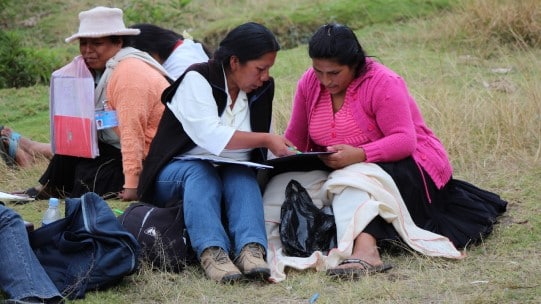
Access to Health
Home-Centered Health
The founder of Future Generations health research initiative, Dr. Carl E. Taylor, studied and advocated for a “home-centered health” approach with the premise that mothers are the biggest producers of health and that the home is the focus of health production and maintenance for the family. Dr. Taylor’s research, which began in the 1940s, gathered the documentation for the 1978 World Conference on Primary Care, and continued through his work on Pregnancy Histories in the decade around 2010.
Children in Nepal learn to wash their face and hands.
Credit: Alton C Byers, Ph.D. (National Geographic Society)
Future Generations faculty have continued to develop research and practice to further explore how this approach can be operationalized and studied in a variety on contexts around the world. The Future Generations approach to health research falls within the scope of Community-Based Primary Healthcare (CBPHC). Community-Based Primary Healthcare is a sustainable alternative method to facility-based care for many, including the most prevalent and basic health conditions and important preventive measures.
Common features include training community health workers, promoting partnerships between community and health programs, commitment to inclusiveness, adapting the program to local conditions, and fostering long-term sustainability. Community-Based Primary Healthcare encompasses a wide range of promising and low-cost approaches for reducing under-five child mortality in resource-poor settings, particularly programs that reach beyond the walls of clinics to provide basic health services and partner with communities.
Future.Edu’s work in CBPHC builds on the Declaration of Alma Ata in 1978, a seminal document that has informed the vision for CBPHC until today. Future.Edu has undertaken a series of research and review efforts to broaden the evidence base and raise the profile of CBPHC. More awareness about the potential impact of CBPHC in the global health community needs to be shared. Field sites can be learning centers and outreach sites need to be increased. Several Future Generations Masters students and faculty are undertaking current research into both global and US-based approaches to implementing CBPHC.
Sharing Histories
Customarily, mothers are taught health lessons which, even if simplified, are paradigmatic and hard to remember. Dr. Laura Altobelli, Research Professor and Director of Future Generations Peru, is leading research to advance a method that transforms the training of community health workers (CHWs), leading to faster progress in knowledge and behavior change of mothers who learn from older women whom they know and trust.
Through systematic recall and sharing memories of personal experiences, this innovative behavior-change method engages and empowers female CHWs to take ownership of their cultural beliefs and practices, and on those build a new collective understanding for future behavior. CHWs gain self-confidence and can better convince other women to uptake knowledge and behavior that improve health and healthcare use in the key first 1,000 days of life (conception to age two).
Dr. Altobelli’s prior study in Peru provides preliminary evidence of reduction of child stunting when government personnel used this methodology to teach CHWs, who then taught mothers with similar methods. The earlier study showed it to be low-cost, simple-to-learn, and effective. It enhances current best practice of participatory women’s groups and home visits by providing a replicable interactive participatory method grounded in local knowledge. Findings corroborate empirically proven conceptual frameworks on memory and behavior change. Future Generations Peru hopes to continue research on the method to demonstrate effectiveness at scale of this maternal behavior change innovation, with reduction in child stunting and anemia, supported and sustained by primary healthcare services and local government, and incorporated into global policy and programs.
More on Sharing Histories:
- Sharing Histories – How To Guide
- Sharing Histories – Health in Hands of Women Project
Systematic Review of Community-Based Primary Healthcare
Community health workers in Peru meet with their local facilitator (center) as part of the project Health in Hands of Women: A test of teaching methods.
In 2007, Future Generations brought together a task force to review the global evidence of CBPHC approaches through a systematic process. The task force included co-chairs Drs. Carl Taylor and Henry Perry, along with Drs. Raj Arole and Abhay Bang. Beginning in 2007 and continuing today, the systematic review has engaged over 115 people and includes over 650 child and maternal health articles, affirming the effectiveness of 19 key community-based interventions. The study reviews approaches that:
- Improve the nutrition of children
- Improve perinatal and neonatal health
- Prevent and treat childhood pneumonia, diarrhea, and malaria
- Expand coverage of immunizations
- Promote behavior changes in the home such as handwashing and family planning
- Prevent mother-to-child transmission of HIV infection
- Improve child health through non-health interventions

Along with Future Generations, the World Health Organization, UNICEF, and the World Bank have all provided grants for this work and anticipate the findings to play an important role in guiding their funding and program policies in child health. The Final report is titled How Effective is Community-based Primary Health Care in Improving the Health of Children?
Researching and Promoting Social Participation in Primary Healthcare Services
The Shared Administration Program in Peru is one of the successful community change experiences that the Future Generations SEED-SCALE methodology is based on. Co-founder Dr. Carl E. Taylor provided orientation to Peru in 1994 at the request of their Minister of Health to design a new program for primary healthcare with community participation. SEED-SCALE was then in the process of development, so the Peru program was designed on the basis of SEED-SCALE principles, while also soon becoming evidence for further development of the methodology.

Since 2000, this community-based health research has been led by Dr. Altobelli, Director of Future Generations Peru. Her research on CLAS and maternal and child health directly informed new national legislation to formalize the CLAS approach. This Future Generations led research has also continued to improve and guide the implementation of CLAS.
Peru is now one of the few countries with a governmental health program that features legalized, regulated, and institutionalized community participation. A 1994 government decree gave community entities collaborative responsibility and decision-making power over the management of public resources to administer primary healthcare services. Called CLAS Associations (Local Health Administration Committees), these private non-profit entities work under contract with the state, and the medical chief of a primary care facility is executive director as the public sector counterpart. The three-way partnership involves government, health services, and community.
How does social participation reflect SEED-SCALE through CLAS? When local people identify their needs instead of only central planners, it improves equity and efficiency of public spending. The watchdog role of citizens overseeing use of public resources ensures transparency and reduces misuse of funds. Citizens can exert social control when they pressure health providers to come to work on time and treat patients well, and can make decisions on purchases (equipment, maintenance, extra staff) to ensure better quality of care. Social participation makes local health and development programs more sustainable. The CLAS program scaled-up rapidly to cover 32% of all 2,700 primary healthcare facilities nationwide because of word-of-mouth from satisfied communities. Future Generations was instrumental in development of a law on CLAS approved in 2007 by the Peruvian Congress that enhanced the SCALE-Cubed policy environment.
Future Generations has played a key role over the years in conducting CLAS program research and evaluation, preparing papers for dissemination and advocacy, and providing technical support on the CLAS program. Documents on the CLAS program in Peru are available through Future Generations University’s publications library.
